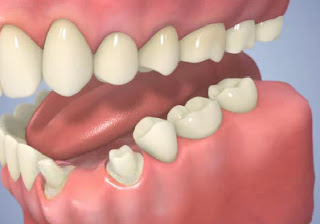Root Canal Therapy Has Come A Long Way
>> Tuesday, 5 April 2011
Root canal therapy has revolutionized dental treatment for dental pulp problems, which is the soft tissue inside the mouth made up of blood vessels, nerves and tissue. At one time, those who had teeth that were infected had no choice but to say goodbye to them; dentists would extract them. However the introduction of therapeutic alternatives has allowed patients to keep their teeth. Root canal therapy is carried out by specially trained professionals known as endodontists or pulp specialists.
Aggressive tooth decay, known as cavities, often works its way down to the nerve and paves the way for dangerous bacteria to attack the nerve. This normally results in infection and further decay. If you are experiencing pain in the mouth when you chew or bite down, have noticed that your teeth feel more sensitive than normal (for example when you drink hot or cold beverages), or you have unexplained facial swelling, you may have pulpal nerve damage. At this stage, you need to make an appointment with your dentist, who will examine your teeth and rule out other oral health issues.
If infected or decayed teeth are not treated, the infection can quickly spread to the surrounding bone, weakening it and preventing it from maintaining the position of the tooth. This is when losing a tooth may be inevitable. The key is to act quickly; do not ignore any pain or discomfort in your mouth.
Your dentist will talk you through the treatment he proposes for your particular problem. Normally, the top of the tooth will be removed to gain access to the pulpal tissue. The dentist is then able to take out the infected area. He will then clean and finish the surrounding tissue to create a clean surface, to which a permanent filler will be able to adhere. This is an important step, in order to prevent future infection, pain and discomfort.
When the area is filled, a crown will be prepared to restore the natural tooth. As this is an extensive procedure, several appointment with your dentist will be required. Regular checks will be carried out to ensure that all bacteria has been eliminated.
After treatment, it is important to pay attention to the treated tooth, which is likely to be far more brittle than a healthy tooth that has never been treated. Expect some discoloration, which can easily be remedied with bleaching. You may experience some minor discomfort for a few weeks after the procedure, but there are many options available for pain relief and treatment of post-op swelling. Your dentist will be able to advise you on all aspects of post-operative care and recommend the right oral hygiene products to keep your teeth clean and fresh.
Root canal therapy is a far more attractive treatment plan than losing an entire tooth, which leaves unsightly gaps in the mouth and ay require further dental attention, for example to have a denture or implant fitted.
If you want to find out more about root canal therapy, click here.
Aggressive tooth decay, known as cavities, often works its way down to the nerve and paves the way for dangerous bacteria to attack the nerve. This normally results in infection and further decay. If you are experiencing pain in the mouth when you chew or bite down, have noticed that your teeth feel more sensitive than normal (for example when you drink hot or cold beverages), or you have unexplained facial swelling, you may have pulpal nerve damage. At this stage, you need to make an appointment with your dentist, who will examine your teeth and rule out other oral health issues.
If infected or decayed teeth are not treated, the infection can quickly spread to the surrounding bone, weakening it and preventing it from maintaining the position of the tooth. This is when losing a tooth may be inevitable. The key is to act quickly; do not ignore any pain or discomfort in your mouth.
Your dentist will talk you through the treatment he proposes for your particular problem. Normally, the top of the tooth will be removed to gain access to the pulpal tissue. The dentist is then able to take out the infected area. He will then clean and finish the surrounding tissue to create a clean surface, to which a permanent filler will be able to adhere. This is an important step, in order to prevent future infection, pain and discomfort.
When the area is filled, a crown will be prepared to restore the natural tooth. As this is an extensive procedure, several appointment with your dentist will be required. Regular checks will be carried out to ensure that all bacteria has been eliminated.
After treatment, it is important to pay attention to the treated tooth, which is likely to be far more brittle than a healthy tooth that has never been treated. Expect some discoloration, which can easily be remedied with bleaching. You may experience some minor discomfort for a few weeks after the procedure, but there are many options available for pain relief and treatment of post-op swelling. Your dentist will be able to advise you on all aspects of post-operative care and recommend the right oral hygiene products to keep your teeth clean and fresh.
Root canal therapy is a far more attractive treatment plan than losing an entire tooth, which leaves unsightly gaps in the mouth and ay require further dental attention, for example to have a denture or implant fitted.
If you want to find out more about root canal therapy, click here.


0 comments:
Post a Comment